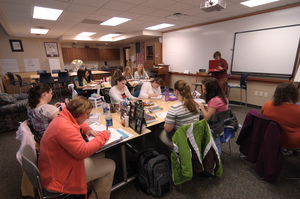CSC's block classes prepare soon-to-be teachers

CHADRON — At the beginning of a college student’s academic career, life after school can seem far away. However, Chadron State College education students enrolled in block classes learn the ability to see what their futures have in store.
Block at CSC is one semester of a yearlong academic program referred to as Professional Year that all education majors must complete in order to graduate. The other semester in the Professional Year is student teaching.
“Past students talk about block and how much work you do. You cover a lot of material in a short amount of time, so it seems like a lot to handle and you know you have to take it in order to graduate,” said Zach Smith, an elementary education major of Gering, Nebraska.
Elementary and secondary block are designed to prepare prospective teachers for the rigors of daily life in the classroom. Chadron State’s education students are accepted into block through an application process that requires applicants to pass certain prerequisites and maintain a 2.75 GPA.
The 12-credit hour course for elementary block is comprised of eight different sessions in a single classroom setting: Classroom management, curriculum and counseling, human relations, assessment, science and health, primary reading, intermediate reading and reading diagnosis.
Block for secondary teaching candidates is worth six credit hours and comprised of classroom management, curriculum and standards, assessment, special education practices and strategies, reading in the content area and human relations.
CSC faculty members Dr. Henry McCallum, Dr. Karen Enos, Dr. Lorie Hunn, Dr. Jesse Sealey and Robin Brierly taught the 22 students enrolled in elementary block this spring. Each of the five individually taught and led different subject materials weekly.
Brierly, who teaches primary reading, intermediate reading and reading diagnosis, tries to incorporate hands-on activities and learning, in the hopes of developing primary teaching skills.
“The courses that I teach in block are filled with skills and strategies that the students will need when they are out in the world as teachers,” Brierly said. “I try to use many hands on activities that they can incorporate in to the classroom.”
Smith said even though the extensive subject material led to extra homework, the class was well instructed.
“Some weeks we had a lot of assignments, but I took a lot from it and I think the instructors managed the time very well, considering there was so much to cover,” Smith said.
Jamie McLain, senior of Chadron, Nebraska, said the discussion driven environment of block sometimes leads to lively discussions, however, the open nature of the course is ultimately engaging.
“Typically, the students lead the discussion. The professors guide us, but the environment is very open and conversational. Our class this semester was very strong-minded and opinionated, so we had some very heated discussions, but we learned a lot because of that,” McLain said. “I thought the instructors did a great job allowing the students to lead in discussion.”
Along with academic lessons, block students benefit from Professional Development Workshops (PDW). The informational lectures are led by instructors ranging from police officers to technology gurus, and explore material not necessarily taught in college.
Justine Ackie, senior of Phoenix, Arizona, said the workshops were instructive and fun.
“The PDWs were awesome and probably my favorite part of block. They showed us things like how to detect the physical signs of someone on drugs and how to run all sorts of technology in the classroom,” Ackie said.
PDWs are not the only view into real world teaching block students get.
Every semester the block class also travels to local schools, so students can observe classrooms in a natural setting. This semester the block class traveled to the Pine Ridge Reservation and Lexington, Nebraska.
McLain, who plans on student teaching in Douglas, Wyoming, this fall, particularly enjoyed the Lexington field trip because the block class met students with multilingual abilities.
“Lexington was impressive because the kids could speak multiple languages fluently and it was interesting to see how the teachers handled that. I met a boy who could speak nine languages fluently,” McLain said.
Block culminates with a critical assessment of the students’ performance, but not in the form of exams or term papers. Students complete evaluations assessing themselves, then instructors review the evaluations and add specific comments or critiques.
Subjects evaluated involve primary academic skills like discussion participation and writing ability and work attire.
“Among the many things on the evaluation, dress attire is one of the areas we must grade ourselves on. Some people don’t prefer it, but I didn’t mind having to dress up every day,” McLain said.
Dress code aside, Ackie, who is student teaching in Chadron this fall, is happy the block experience is available at CSC.
“Not all colleges have something like a block semester and usually go straight into student teaching,” Ackie said. “I am happy Chadron State requires it, because now I feel much more prepared to teach.”
Category: Campus News, Education
